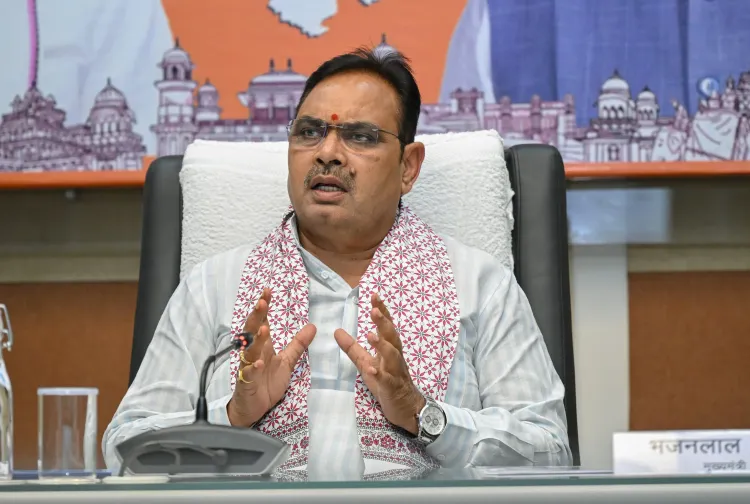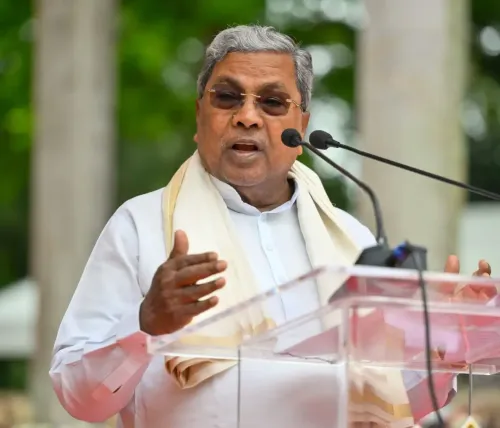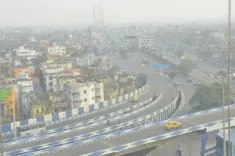How is Rajasthan Boosting Employment and Investment with New Policies?

Synopsis
Key Takeaways
- Rajasthan's new policies aim to boost employment.
- Focus on establishing a global medical tourism hub.
- Significant reforms in urban development are introduced.
- Investment opportunities in energy sectors are expanded.
- Amendments in education service rules to enhance promotions.
Jaipur, July 14 (NationPress) In a calculated effort to establish Rajasthan as a premier global destination for medical tourism and to ignite sustainable urban and economic growth, the state cabinet, led by Chief Minister Bhajan Lal Sharma, sanctioned a range of transformative policies during a meeting convened on Monday at the Chief Minister’s Office.
Deputy Chief Minister Prem Chand Bairwa, Parliamentary Affairs Minister Jogaram Patel, and Food and Civil Supplies Minister Sumit Godara jointly addressed the media, shedding light on the cabinet’s resolutions, which encompass significant reforms in health, infrastructure, and energy sectors.
One of the landmark approvals includes the ‘Heal in Rajasthan Policy-2025’, aimed at positioning the state as a top-tier Medical Value Travel (MVT) hub.
This policy is designed to provide world-class healthcare at competitive prices, blending modern medical practices with traditional therapies such as Ayurveda, Yoga, Unani, and Siddha.
Investors will benefit from the Rajasthan Investment Promotion Scheme (RIPS), Industrial Development Policy, and the Tourism Policy under this initiative.
This strategic move is anticipated to generate employment opportunities, invigorate the state’s economy, and enhance Rajasthan’s branding in the global healthcare arena. In addition, the cabinet approved the Township Policy-2024 to foster organized and inclusive urban development.
This new policy stipulates that 7% of the area in all residential projects is designated for parks and playgrounds, along with 8% for public utilities. Developers must also mortgage 2.5% of plots for maintenance for five years post-completion, until they are transferred to Resident Welfare Associations (RWAs).
It outlines rules for group and flat housing, mixed land usage, and mandates that 5% of plots in industrial schemes be allocated for worker housing.
Additionally, it emphasizes rainwater harvesting, wastewater recycling, and land acquisition through mutual consent for sector roads, aligning with the Jaipur Development Authority (JDA)'s commercial policies. A state-level committee will oversee the implementation.
Another significant decision was the Rajasthan City Gas Distribution (CGD) Policy-2025, focused on extending PNG and CNG networks to smaller towns while promoting a cleaner, gas-based economy.
This policy streamlines land allotment and approval processes for gas companies and will remain in effect until March 31, 2029.
A dedicated CGD portal will be introduced to facilitate investor access and enhance public services. In a pivotal advancement for the energy sector, the Cabinet sanctioned the formation of three joint venture companies in partnership with Central Public Sector Undertakings (CPSUs), following MoUs signed on August 8 and September 29, 2024.
These joint ventures are projected to draw in Rs 11,200 crore in investments, accelerating both renewable and conventional energy projects throughout the state.
The government will fund its share capital from existing assets. Further reforms have been introduced to service rules to broaden employment and promotion opportunities.
The Cabinet endorsed the creation of a new position—Senior Agriculture Supervisor (Level-10)—in the Agriculture Department, providing a promotional trajectory for Agriculture Supervisors (Level-5). This role has now been officially incorporated into the Rajasthan Civil Services (Revised Pay) Rules, 2017.
To tackle enduring procedural barriers in higher education promotions, the cabinet has integrated the third and fourth amendments of the UGC Regulations, 2018 into the Rajasthan Education Service (College Branch) Rules, 1986.
These amendments extend the exemption for mandatory refresher or orientation courses under the Career Advancement Scheme (CAS) until December 31, 2024.
Additionally, changes to the Rajasthan Education (State and Subordinate) Service Rules, 2021 will permit UGC-recognized degrees in agriculture (instead of just ICAR) for professor-level posts and B.Ed. qualifications exclusively from NCTE-recognized institutions.
To enhance institutional efficiency, the number of members in the Rajasthan Public Service Commission (RPSC) will increase from 7 to 10.
This strategy aims to improve the Commission’s administrative capabilities and expedite recruitment processes. Meanwhile, governance of the Rajasthan Information Commission (RIC) will be strengthened through the establishment of a new Governing Board.
The cabinet also ratified amendments to the Rajasthan Integrated Clean Energy Policy-2024, enabling investors in renewable or green hydrogen projects exceeding 1000 MW—those without Power Purchase Agreements (PPAs) or grid connectivity—to apply for land allocation through the Revenue Department, following registration and fee payment to the Renewable Energy Corporation.
In another significant institutional shift, the cabinet approved the reconstitution of the Executive Committee and Governing Board of the Rajasthan International Centre (RIC), Jaipur.
The new governing body will operate under the Rajasthan International Centre Jaipur Society and will consist of 15 members: the Chief Secretary as chair, six government officials, six members nominated by the state government, two RIC members, and the Director of RIC.
An Executive Committee will also be established for operational oversight. Furthermore, the cabinet endorsed the introduction of the Rajasthan University of Health Sciences (Amendment) Ordinance-2025, aimed at upgrading the existing RUHS to create the Rajasthan Institute of Medical Sciences (RIMS) in Jaipur.
This proposed institute will be modeled after AIIMS Delhi and will operate as an autonomous center of excellence in medical education and healthcare.
In a compassionate initiative, the cabinet relaxed regulations under the Rajasthan Permanent Total Disabled Compassionate Appointment Rules-2023 to facilitate the appointment of Omprakash, son of former Head Constable Shri Bhagaram, who became permanently disabled in a road accident in October 2021. Despite his disability certificate being issued in 2024—by which time he had less than five years of service remaining—the state has granted an exception for compassionate employment for his dependent.
Finally, the cabinet sanctioned the renaming of three educational institutions to honor local and national figures.
These extensive policy decisions highlight the Rajasthan government’s dedication to inclusive development, effective governance, and transformative reforms across crucial sectors.









